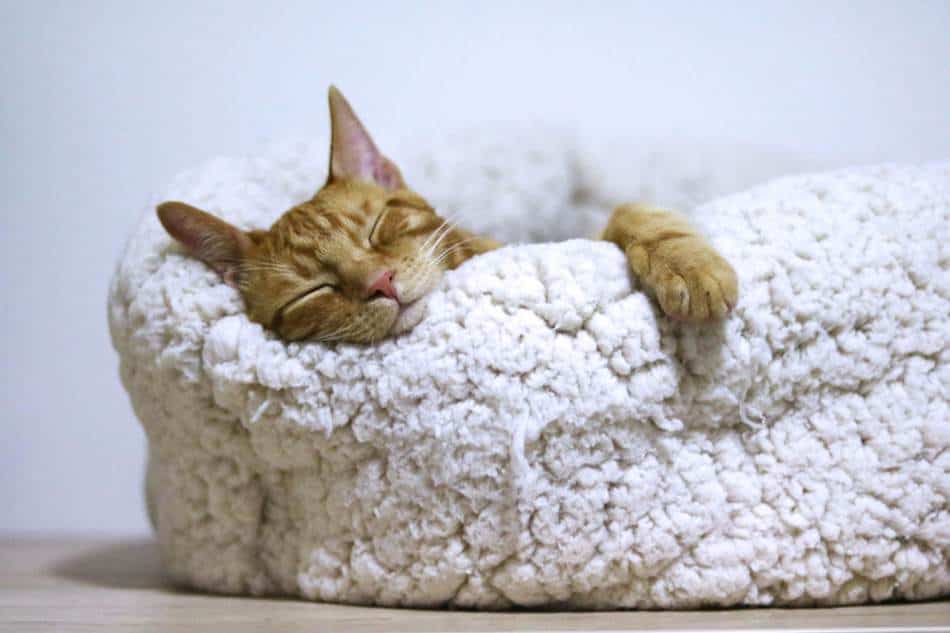 The sound of throaty purring is one of the delightful and unique things about cats that draws us to them. Their unusual vocal expressions are charming and sometimes surprising. However, there’s more to a cat’s purr than meets the eye or ear. Housecats can help you heal bones, de-stress when you’ve had a bad day, or keep you calm in a bad situation with a purr and a friendly bonk from their fuzzy faces. Yet one of the strangest things about cats is their ability to purr while sleeping. I couldn’t help but wonder how and why they do that, so I decided to do some in-depth research on the subject recently. What I learned about cat’s purring surprised even me, and I think you’ll find it intriguing.
The sound of throaty purring is one of the delightful and unique things about cats that draws us to them. Their unusual vocal expressions are charming and sometimes surprising. However, there’s more to a cat’s purr than meets the eye or ear. Housecats can help you heal bones, de-stress when you’ve had a bad day, or keep you calm in a bad situation with a purr and a friendly bonk from their fuzzy faces. Yet one of the strangest things about cats is their ability to purr while sleeping. I couldn’t help but wonder how and why they do that, so I decided to do some in-depth research on the subject recently. What I learned about cat’s purring surprised even me, and I think you’ll find it intriguing.
Why do cats purr when they sleep? If your cat is lying there, with closed eyes, breathing evenly and purring, they may not be sleeping at all. Cats purr, regardless of whether they appear to be sleeping or not, for several reasons. They purr for healing, hunger, pain, nervousness, and joy. There is no single reason why a sleeping cat purrs.
How Do Cats Purr
To understand why a sleeping cat might purr, you need to know how they pull off the strange feat. The sound is so familiar that we almost overlook it, but the process is unique. Moreover, for years, scientists weren’t quite sure how it was happening.
I recommend that you check out a great cat bed that will make your cat purr even more. Click here to view the Meowflia premium bed on Amazon.
Originally the hypothesis was that purring was a result of blood flowing to the inferior vena cava. What that means is blood, which had been deoxygenated; after moving through a cats’ body, returning to the heart was thought to cause the rumble. It’s sweet that we once believed purring quite literally came from the heart, but ultimately it wasn’t correct.
Instead, it’s now believed that the sound comes from the larynx. Specifically, it’s a result of the muscles inside the larynx vibrating as the cat breathes in and out. The ability to sustain a purr while breathing means it doesn’t matter which way the air is moving. Your kitty is purring just by breathing in a unique way.
In essence, cats are practicing circular breathing over their instruments similar to a professional musician who plays a woodwind or brass learns to breathe in and out while maintaining a flow to the mouthpiece. However, kitties vibrate their ‘instrument’ on both the in and outflow, unlike musicians who are creating the sounds with a continuous outflow of air.
Why Do Cats Purr
Your cat purrs, whether awake or asleep, for more reasons than you might expect. It has different meanings at different times. Here are most of the reasons cats might purr:
- Cats purr to express happiness in general.
- Some cats purr when they eat.
- Often kittens will purr when they drink milk.
- Older cats who knead purr because they remember drinking mommy’s milk.
- A cat who is in pain will purr to help themselves heal.
- Stressed out cats purr to relieve anxiety.
- When giving birth your kitty may purr because it helps prep her body to heal.
- If your cat thinks you are hurt they may sit on you and purr.
- Similar to healing, a cat may sit on you and purr to reduce your stress level.
- Dying cats may also purr to help ease their passing.
Not All Cats Truly Purr
Intriguingly, housecats can purr because they cannot roar, and sleep has nothing to do with it. The two sounds are mutually exclusive in felines. There are plenty of wildcats who can also purr. Some do this the same way as our little companions. Meanwhile, others only vibrate the larynx muscles on breathing in.
Leopards, lions, Jaguars, and Tigers are the odd-cats-out in this case. Something about the genus Panthera, which these four larger wildcats all belong to, evolved slightly differently. Their ability to roar comes from having a different voicebox.
Where your pet has an epihyal bone as part of their sound creating organ, these larger felines have developed a different way of making sounds. Instead of the bone, they have a ligament. The change means they can channel air into making a much larger and more intimidating sound.
Does that trade-off mean that a purr is actually a modified roar? Well, not exactly. Physically the Pantheras traded their ability to hum for the ability to intimidate with a big sound, but they don’t serve the same purpose.
Purrs are not used for intimidation. While both are forms of expression, a roar is more like hissing or growling regardless of where they made the evolutionary trade-off. Big Panthera cats can growl and hiss too, but their loud, challenging roar is more effective.
Unfortunately, this also means that some of the big cats are missing the smaller cat superpower. I’ll get back to this in a bit, but first, let’s look at what your cat is saying with that distinctive vocalization.
The Theory of Purring: Kitty Superpowers
You probably think that when your sleeping kitty starts rumbling with purrs, it’s a sign of happiness. It may shock you to discover that isn’t always the case. Cats do purr to express joy when they’re getting a good tickle or scratch, but it’s not the only reason why they make the sound. To increase the joy level of your cat, I suggest that you read the reviews on Amazon for the AmazonBasics Scratching Post and Hammock by clicking here.
A cat who is purring while they seem to be sleeping might be in pain. Though they’re usually awake, a sleeping feline could be subconsciously activating their healing superpower. Though it sounds silly, a purr vibrates between 25 and 140 hertz, which is the exact frequency required to heal damaged tissue and bone.
Both cats and their people can benefit from this vibrational healing. Doctors help damaged patients by simulating this tone in some cases. The sound also helps calm nerves and reduce stress, which can indirectly lead to longer and happier lives.
Researchers who study cats believe they purr when giving birth, or at other times when they aren’t feeling well in order to aid their bodies. If you could hum and make your immune system work better, you probably would ‘purr’ too.
Beyond Sleep Purring: Strange Cat Behavior
Sure, sleep purring is unexpected, but your cat does lots of strange things, and some of them are just for you. Mysterious kitty behavior is more than just an accident. For example, a cat who parks in your lap while you’re working could be in it for the attention, but they’re also aware of our moods and needs.
Sitting on you, or your computer/project and purring away while you’re focused on stressful activities could be more about giving you comfort than getting what they want. Cats are extremely helpful, after all. In fact, they’re so helpful that they adopted us.
Cats Help People With More Than Their Purring
It turns out that a whole lot of what people think they know about cats simply isn’t true. They may not even be domesticated. It turns out that recent studies show cats don’t have the genetic markers present in other domestic animals. In short, they volunteered rather than being bred for the job of taking care of us.
It’s no wonder ancient Egyptians thought they were gods. Cats came into human lives like beneficent spirits and kept town our pest problems because it was easier than wild hunting. Our collection of bugs and rodents that were destroying food supplies and spreading disease was just lunch for these savvy little predators, so they did us a favor.
Over time we learned to do more than tolerate that strange trait. By bringing felines inside, taking care of them, and tending to a cats’ needs, we gained helpers who stuck around and lived longer. However, the arrangement wasn’t our idea.
Purring & Kitty Communication
In addition to their sensitivity and purring for our benefit, cats try to communicate with us in other ways. If you’ve ever picked up a strange cat and immediately gotten purring, it could be an expression of nervousness. The kitty was trying to calm down.
Fake sleeping is another cat communication technique. When your cat sits or lays with their eyes closed, but it seems more like they’re ignoring you than sleeping, you’re half right. Your pet isn’t pretending they can’t hear you, but they are not asleep either. This is a way for them to show the ultimate trust and love.
Cats are vulnerable when they rest, and by faking it around you, they’re saying they feel safe and cared for. However, the long, slow, sleepy blink is pretty much the same thing. Cats express their love by showing you that they think they can sleep around you, or by closing their eyes. Your pet knows they won’t get attacked with you right there to save them, so they show it.
Did you know that cats don’t usually meow to each other as adults? Kittens meow to their mothers because it gets attention, and the mommy cat will tend to their needs if they mewl. However, at a certain point in their development, the moms stop listening and expect them to ‘adult’ on their own.
Humans, on the other hand, keep responding. That’s why our kitties talk to us. Plus, cats use the same ‘kitten’ noise when they’re in trouble to attract attention from other cats or humans.
Perhaps the most obvious feline communication is the growling, hissing, and spitting they do when they’re angry. Along with puffing up and turning sideways, it’s an intimidation tactic, like a roar. While it may not work on most humans, for animals, it’s alarming when something doubles in size and gets aggressive.
Final Thoughts
You may want to let sleeping cats purr, but make sure you check in with your kitty to make sure there’s nothing wrong. A pregnant cat might be telling you babies are coming, and a sick or injured cat is trying to heal. Similarly, a nervous cat is calming itself.
While cats do purr out of joy, it’s not how they express love. A cat who is sitting up with their eyes closed, almost pretending to sleep, is showing love and trust. Alternately, when they look at you and give long slow blinks, this is kitty morse code for ‘I Love You.’
So-called ‘sleep purring’ could be a sign of deep contentment, but it’s not your cats’ way of expressing love. More likely, they are either healing or happy and resting their eyes, but mentally awake.
